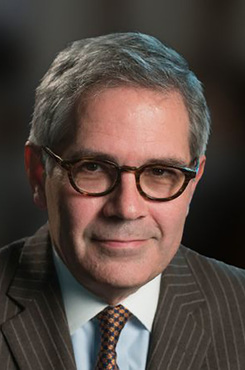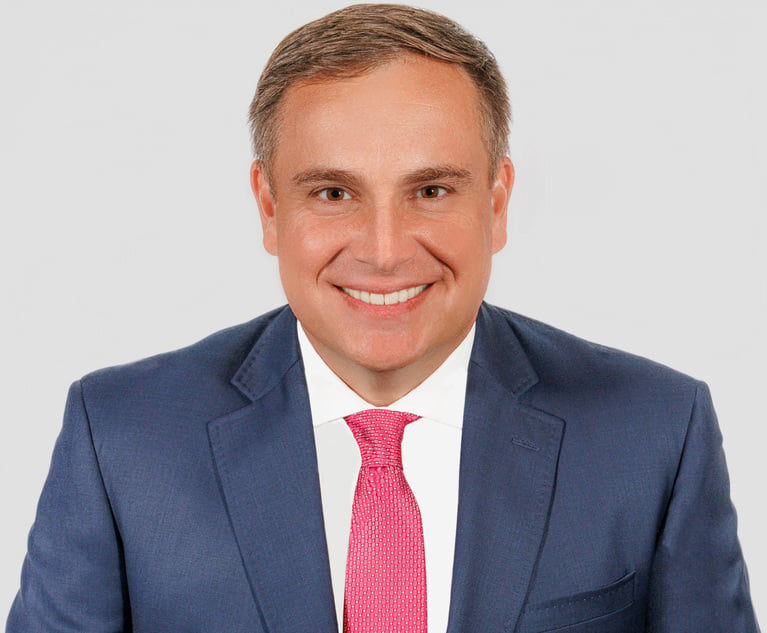Team in Place, Is Krasner Past Turbulence and Ready to Deliver Change?
Although some are taking positive signs from the past week and others say they have some lingering concerns, almost everyone who spoke with The Legal is treating the situation much like they would the weather in January in Pennsylvania—with a wait-and-see approach.
January 12, 2018 at 05:58 PM
5 minute read
 Larry Krasner.
Larry Krasner. At first it was frigid. There were flurries and then there was confusion, but by the end of the week, things were beginning to thaw.
That could describe weather reports over the past two weeks, but it could also describe the first two weeks of Philadelphia District Attorney Larry Krasner's tenure.
On Jan. 5, after less than five days in office, Krasner asked dozens of seasoned prosecutors to leave the office. Following the ensuing flurry of resignations, there was some confusion at the courthouse. But later in the week Krasner slowly began to unveil his new appointees and office structure, and, by Friday, many in the defense bar were offering warmer regards toward the new administration.
“Larry was elected with a promise of bringing in sweeping change, and change is hard,” Ben Waxman, a spokesman for the office, said. “I think things are moving in the right direction now that there's a new leadership team in place.”
Although some are taking positive signs from the past week and others say they have some lingering concerns, almost everyone who spoke with The Legal is treating the situation much like they would the weather in January in Pennsylvania—with a wait-and-see approach.
“Time will tell whether this is to the benefit or detriment,” Stradley Ronon Stevens & Young chairman William Sasso, who has been a part of several transition teams, said. “But you have to give the boss the benefit of the doubt, and give him time to prove his point.”
Lingering Concerns
The source of the greatest concern from those in the defense bar stems from the dismissal of more than 30 DA's office personnel in one day.
According to most court watchers, the number of people Krasner fired was on the higher end when it comes to transitions.
Although Krasner has often pointed to Pennsylvania Attorney General Josh Shapiro as having fired a larger number of attorneys during his transition, news reports at the time indicate Shapiro only fired six people during his first week in office. A spokesman for the Attorney General's Office declined to comment, but, according to sources familiar with Shapiro's transition, who declined to be named for the story, the news reports were accurate.
But, more than the number, attorneys mostly took issue with the manner in which the shake-up occurred.
News of the shake-up broke as a snowstorm and freezing temperatures bore down on Philadelphia, leading the courts to close early, and Krasner did not speak publicly about the firing until four days later.
Several attorneys said they were disappointed at how the timing led to dramatic photos being published in the local media showing career prosecutors carrying boxes of their belongings out the door for the last time. One attorney familiar with administrative transitions said such a dramatic shake-up can create “an atmosphere of chopping off heads,” which can potentially lead to morale problems.
Also, in the immediate aftermath of the firings, there was confusion within the defense bar, as several criminal defense attorneys said they were left wondering who they would be dealing with the following Monday. At least three prosecutors were also widely, and incorrectly, reported to have been fired during the shake-up. Krasner's team has not yet released the names of those who have been dismissed.
Although many said their cases were not affected by the change, one attorney said some ADAs appeared to be “overworked” in the wake of the firings, and at least one homicide trial that had been set to begin Jan. 8 had to be pushed back several months because the prosecutor assigned to the case had been one of those asked to leave.
Several attorneys said they were left scratching their heads over why the prosecutor had not been allowed to stay on at least until the trial was finished, and one defense attorney, who declined to be named, said the swift changes possibly hinted at an “ideological zeal” that could be a cause for lingering concern. The attorney said the move showed a potential disregard for the normal course of business, which could needlessly trip up the administration and leave it open for criticism and speculation.
“When your focus is on ideological issues you tend to forget about what you need to do to get the job done,” the attorney said.
Positive Forecast
As Krasner's tumultuous second week in office progressed, he announced several key appointments that most attorneys agreed said helped to settle their nerves.
On Tuesday, Krasner announced that he had appointed Schnader Harrison Segal & Lewis attorney Nancy Winkelman as the interim supervisor of the office's law department, which handles appeals.
“That's a very good hire,” Obermayer Rebmann Maxwell & Hippel lawyer and former state Attorney General Walter Cohen said of Winkelman, echoing a sentiment repeated by several court watchers.
Two days later Krasner announced former Philadelphia Court of Common Pleas Judge Carolyn Engel Temin as his second-in-command. Temin has been widely regarded as a good choice for that role, and someone who, one defense lawyer said, “will come at it more practically.”
Krasner campaigned on a promise of bringing sweeping progressive change to the office. Although some defense attorneys questioned how far he will be able to realistically push that agenda given the day-to-day needs of the office, many agreed that there are many significant and practical reforms that Krasner can easily achieve.
“If there is a top-down effort to reform and make sure prosecutors are following the rules under Brady [v. Maryland], if that permeates the office, it will be a good thing for the city,” one defense attorney said. “If more faith is restored to the institution, that is a good thing for everybody.”
This content has been archived. It is available through our partners, LexisNexis® and Bloomberg Law.
To view this content, please continue to their sites.
Not a Lexis Subscriber?
Subscribe Now
Not a Bloomberg Law Subscriber?
Subscribe Now
NOT FOR REPRINT
© 2025 ALM Global, LLC, All Rights Reserved. Request academic re-use from www.copyright.com. All other uses, submit a request to [email protected]. For more information visit Asset & Logo Licensing.
You Might Like
View All
Pa. Superior Court Rules Pizza Chain Liable for Franchisee Driver's Crash
4 minute read
Pa. Defense Firm Sued by Client Over Ex-Eagles Player's $43.5M Med Mal Win
3 minute read

Trending Stories
Who Got The Work
J. Brugh Lower of Gibbons has entered an appearance for industrial equipment supplier Devco Corporation in a pending trademark infringement lawsuit. The suit, accusing the defendant of selling knock-off Graco products, was filed Dec. 18 in New Jersey District Court by Rivkin Radler on behalf of Graco Inc. and Graco Minnesota. The case, assigned to U.S. District Judge Zahid N. Quraishi, is 3:24-cv-11294, Graco Inc. et al v. Devco Corporation.
Who Got The Work
Rebecca Maller-Stein and Kent A. Yalowitz of Arnold & Porter Kaye Scholer have entered their appearances for Hanaco Venture Capital and its executives, Lior Prosor and David Frankel, in a pending securities lawsuit. The action, filed on Dec. 24 in New York Southern District Court by Zell, Aron & Co. on behalf of Goldeneye Advisors, accuses the defendants of negligently and fraudulently managing the plaintiff's $1 million investment. The case, assigned to U.S. District Judge Vernon S. Broderick, is 1:24-cv-09918, Goldeneye Advisors, LLC v. Hanaco Venture Capital, Ltd. et al.
Who Got The Work
Attorneys from A&O Shearman has stepped in as defense counsel for Toronto-Dominion Bank and other defendants in a pending securities class action. The suit, filed Dec. 11 in New York Southern District Court by Bleichmar Fonti & Auld, accuses the defendants of concealing the bank's 'pervasive' deficiencies in regards to its compliance with the Bank Secrecy Act and the quality of its anti-money laundering controls. The case, assigned to U.S. District Judge Arun Subramanian, is 1:24-cv-09445, Gonzalez v. The Toronto-Dominion Bank et al.
Who Got The Work
Crown Castle International, a Pennsylvania company providing shared communications infrastructure, has turned to Luke D. Wolf of Gordon Rees Scully Mansukhani to fend off a pending breach-of-contract lawsuit. The court action, filed Nov. 25 in Michigan Eastern District Court by Hooper Hathaway PC on behalf of The Town Residences LLC, accuses Crown Castle of failing to transfer approximately $30,000 in utility payments from T-Mobile in breach of a roof-top lease and assignment agreement. The case, assigned to U.S. District Judge Susan K. Declercq, is 2:24-cv-13131, The Town Residences LLC v. T-Mobile US, Inc. et al.
Who Got The Work
Wilfred P. Coronato and Daniel M. Schwartz of McCarter & English have stepped in as defense counsel to Electrolux Home Products Inc. in a pending product liability lawsuit. The court action, filed Nov. 26 in New York Eastern District Court by Poulos Lopiccolo PC and Nagel Rice LLP on behalf of David Stern, alleges that the defendant's refrigerators’ drawers and shelving repeatedly break and fall apart within months after purchase. The case, assigned to U.S. District Judge Joan M. Azrack, is 2:24-cv-08204, Stern v. Electrolux Home Products, Inc.
Featured Firms
Law Offices of Gary Martin Hays & Associates, P.C.
(470) 294-1674
Law Offices of Mark E. Salomone
(857) 444-6468
Smith & Hassler
(713) 739-1250





